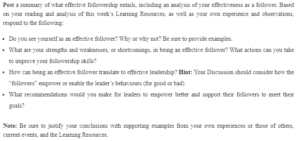Being An Effective Follower
To be an effective follower, one must be able to put the team’s needs above their own. An effective follower can also take direction well and work collaboratively with others. Furthermore, an effective follower can communicate effectively and provide feedback when needed. Finally, an effective follower can show initiative and take on tasks when required.
I believe that I am an effective follower. I can put the team’s needs above my own, and I can take direction well. I am also able to work collaboratively with others, and I can communicate effectively. I am also able to show initiative and take on tasks when needed.
An effective follower is someone who can take direction from a leader and execute it in a way that benefits the group or organization as a whole. This person can also provide feedback to the leader in a constructive way that can help improve the team’s overall effectiveness.
- One example of an effective follower is someone who can take direction from a leader and execute it in a way that benefits the group or organization as a whole. This person can also provide feedback to the leader in a constructive way that can help improve the team’s overall effectiveness.
- Another example of an effective follower is someone who can take direction from a leader and execute it in a way that benefits the group or organization as a whole. This person can also provide feedback to the leader in a constructive way that can help improve the team’s overall effectiveness.
One’s strengths as a follower may include being adaptable, taking direction well, and being a good team player.
One’s weaknesses as a follower may include the tendency to be passive, to be a people pleaser, or to be overly compliant.
To improve one’s followership skills, one can work on being more assertive, taking more initiative, and being more independent.
Positively, an effective follower allows the leader to focus on the bigger picture while someone else manages the more minor details. This makes the leader more strategic and less bogged down by operational tasks. In addition, an effective follower will provide honest feedback and different perspectives, which can help the leader to make better decisions. Finally, an effective follower is a reliable support system that the leader can rely on during stress.
Negatively, an effective follower can make a leader lazy or complacent. If the leader knows they can always rely on the follower to pick up the slack, they may be less likely to work hard themselves. In addition, an effective follower can be a Yes-Man and always agree with the leader, even when they are wrong. This can create a toxic environment where dissenting opinions are not tolerated.
1. Leaders should be clear about what they expect from their followers.
2. Leaders should provide followers with resources and support to meet their goals.
3. Leaders should allow followers to provide feedback and input on their goals and objectives.
REFERENCES
Uhl-Bien, M., Riggio, R. E., Lowe, K. B., & Carsten, M. K. (2014). Followership theory: A review and research agenda. The leadership quarterly, 25(1), 83-104.
Bjugstad, K., Thach, E. C., Thompson, K. J., & Morris, A. (2006). A fresh look at followership: A model for matching followership and leadership styles. Journal of behavioural and applied management, 7(3), 304-319.
ORDER A PLAGIARISM-FREE PAPER HERE
We’ll write everything from scratch
Question
Robert Kelley (1992), the author of The Power of Followership, suggested that influential followers possess four common qualities:

Being An Effective Follower
- They are self-managing and able to work effectively without direct supervision;
- They are very committed to the organization’s goals;
- They have a high level of competence and mastery of their job skills; and
- They act with a high level of credibility and ethics in their job performance.
In this Discussion, you will consider what it means to be a good follower and your own effectiveness in that role.
RESOURCES
To prepare for this Discussion:
- Review this week’s Learning Resources on followership.
- Consider your strengths and areas for growth as a follower and how you might improve your followership skills.
BY DAY 3
Post a summary of what effective followership entails, including an analysis of your effectiveness as a follower. Based on your reading and analysis of this week’s Learning Resources, as well as your own experience and observations, respond to the following:
- Do you see yourself as an effective follower? Why or why not? Be sure to provide examples.
- What are your strengths and weaknesses, or shortcomings, in being an effective follower? What actions can you take to improve your followership skills?
- How can being an effective follower translate to effective leadership? Hint: Your Discussion should consider how the “followers” empower or enable the leader’s behaviours (for good or bad).
- What recommendations would you make for leaders to empower better and support their followers to meet their goals?
Note: Be sure to justify your conclusions with supporting examples from your own experiences or those of others, current events, and the Learning Resources.
Refer to the Week 4 Discussion Rubric for specific grading elements and criteria. Your Instructor will use this grading rubric to assess your work.
Read some of your colleagues’ postings.
https://go.gale.com/ps/i.do?p=EAIM&u=minn4020&id=GALE|A350337252&v=2.1&it=r&sid=ebsco&asid=66bbcdaa

